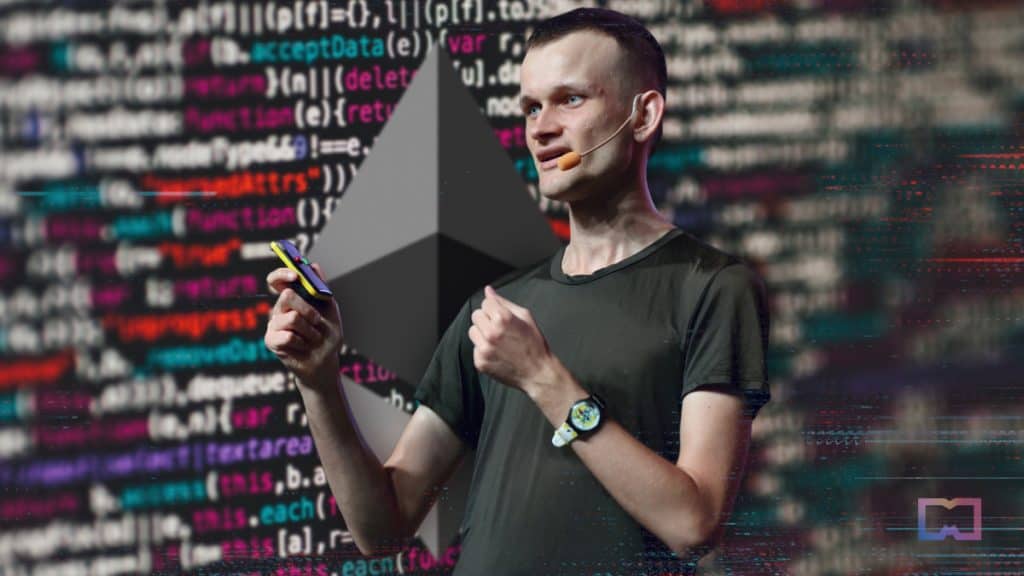Vitalik Buterin Addresses Ethereum’s Persistent Challenges in Recent Speech


In Brief
Ethereum co-founder Vitalik Butern recently delivered a speech at Nanyang Technological University in Singapore.
He mentioned that scalability remains a persistent challenge, with solutions like sharding explored to enhance transaction processing speed.
Ethereum has made significant improvements in privacy through technologies like zk-SNARKs, which facilitate private transactions.

Recently, Ethereum’s co-founder, Vitalik Buterin, took the stage at Nanyang Technological University in Singapore to talk about the challenges and solutions facing Ethereum.
Buterin’s opening words in his speech set the tone for the exploration of Ethereum’s transformation: “Today I’m going to look back at the history of Ethereum, starting with its beginnings in 2013 and 2014, and some of the changes the project has gone through since then, and how we think about some issues differently than we did 5 or 10 years ago.”
Ethereum’s Birth and Ambitious Vision
Ethereum traces its roots back to 2013 when the seeds of the blockchain’s vision were planted. It all culminated in 2014 with the publication of the Ethereum white paper, a blueprint for a blockchain platform that has since become the second-largest cryptocurrency network by market capitalization after Bitcoin.
But Ethereum was no mere replica of its crypto predecessor, Bitcoin. It had a grander agenda. Unlike Bitcoin, Ethereum aimed to be a network where developers could build their blockchain-based applications.
“It is a blockchain, but unlike previous systems that tried to support only one application, Ethereum allows users to build their own applications,” Butern explained. “This means that users can write their own application code, then upload the code to the blockchain, and the application can then run on the blockchain.”
The introduction of smart contracts was a game-changer. Buterin elaborated, “The concept of smart contracts is that you can have computer programs on the blockchain that can directly control digital assets. An asset does not have to be owned by an individual, it can be owned by a program.”
This innovation has given rise to complex applications, including prediction markets, stablecoins, and Decentralized Autonomous Organizations (DAOs). DAOs allow organizations to govern themselves through smart contracts, eliminating the need for legal systems to resolve disputes.
Navigating Challenges Facing Ethereum
While Ethereum has come a long way, several challenges persist. Scalability, or processing speed, has been a continuous concern.
“If you ask me or anyone else what the biggest issues facing Ethereum are, you’ll get basically the same answer: privacy, consensus, smart contract security, and scalability,”
Vitalik said as a matter of fact.
To improve scalability Ethereum has explored sharding, a blockchain scaling technique that aims to improve network performance and capacity by breaking the database or blockchain into smaller, more manageable parts called “shards.”
Last year, Ethereum’s transition from the energy-intensive Proof-of-Work to a more eco-friendly Proof-of-Stake consensus mechanism dubbed “The Merge” was another pivotal step. The Merge has reduced the network’s energy consumption by ~99.95%.
Advances in Privacy and Security with Zero-Knowledge Proofs
Addressing privacy challenges, Buterin brought up zero-knowledge proofs, or zk-SNARKs. This technology allows users to create cryptographic proofs that verify data without revealing any other information about that data.
“Back in 2017, the challenge was simply to bring this technology to Ethereum and make zk-SNARKs kick in,” Buterin said. “These techniques are based on a complex mathematical theory called elliptic curve cryptography. In terms of using this technology, we basically added some overlays called “zero-knowledge statements,” which are things that allow you to use zk-SNARKs code.”
Fast forward to 2023, the ZK landscape is seeing a number of advanced zk-SNARKs Libraries, development environments, tools, and protocols, Vitalin said. These include ZK-STARK, ZK Rollup, and Cairo, a Turing-complete programming language developed by StarkNet.
Buterin warned that privacy may see another bottleneck due to legal issues related to whether the tokens launched by these systems will be accepted by financial authorities in different jurisdictions.
In response to the potential legal ramifications mentioned above, he introduced the concept of “Proof-of-Innocence.”
“The goal of Proof of Innocence is for you to prove that your coins were transferred through the privacy system, but did not come from one of the hackers. You prove that you are not one of the hackers without fully disclosing where the tokens came from,” Buterin explained. A paper on this idea will be published soon, he said.
Highlighting the differences in the challenges faced in 2017 and 2023, Buterin added: “In 2017 we were just trying to get the basic building blocks to work, and in 2023 those building blocks are already working, but our focus is on optimizing those building blocks and doing some more complex work that integrates better with the mainstream world.”
Democratizing Finance and The Pursuit of True Decentralization
In the real world, Ethereum’s impact hasn’t gone unnoticed. DeFi (Decentralized Finance) has democratized finance, making cryptocurrencies accessible even to those without traditional banking systems.
Buterin recounted an experience he had when he travelled to Argentina in 2021, as an example.
According to Washington Post, Argentina plunged into an economic crisis in 2018, due to its highly dollarized economy and the depreciation of the Argentine peso, amongst other factors. This left Argentines turning to cryptocurrency as a safe bet against the peso.
“I remember on Christmas Day most places were closed so I was just looking for a coffee shop. The first coffee shop I found, the owner recognized me and told me he had encrypted a wallet, so I asked him if I could pay with Ethereum and he said yes, so we paid with Ethereum.”
Yet, another significant challenge remains—the need for true decentralization “We’re working on that, but the problem is that a decentralized approach like this doesn’t really exist for someone like that coffee shop owner. Although it is technically possible to be more decentralized, the way of decentralization does not actually exist for these currency holders,” Buterin lamented.
A Glimpse of Ethereum’s Future
He expressed uncertainty about the possibility of enabling cryptocurrency holders to utilize the blockchain effectively, reap its benefits, and enjoy the advantages of decentralization and global permissionless access.
Furthermore, the question remains whether it is possible to realize a world where individuals can genuinely profit from the myriad application areas envisioned since 2013. The central challenge lies in converting these conceptual ideas into genuinely beneficial applications that improve people’s lives.
As Buterin concluded his speech, he said: “These are some of the biggest changes we’ve seen in the past 10 years. It’s been a long, slow journey from an initial concept to a process of gradually solving various challenges in practical use. I hope that in the next 5 years we will be able to solve most of these challenges.”
Disclaimer
In line with the Trust Project guidelines, please note that the information provided on this page is not intended to be and should not be interpreted as legal, tax, investment, financial, or any other form of advice. It is important to only invest what you can afford to lose and to seek independent financial advice if you have any doubts. For further information, we suggest referring to the terms and conditions as well as the help and support pages provided by the issuer or advertiser. MetaversePost is committed to accurate, unbiased reporting, but market conditions are subject to change without notice.
About The Author
Cindy is a journalist at Metaverse Post, covering topics related to web3, NFT, metaverse and AI, with a focus on interviews with Web3 industry players. She has spoken to over 30 C-level execs and counting, bringing their valuable insights to readers. Originally from Singapore, Cindy is now based in Tbilisi, Georgia. She holds a Bachelor's degree in Communications & Media Studies from the University of South Australia and has a decade of experience in journalism and writing. Get in touch with her via [email protected] with press pitches, announcements and interview opportunities.
More articles

Cindy is a journalist at Metaverse Post, covering topics related to web3, NFT, metaverse and AI, with a focus on interviews with Web3 industry players. She has spoken to over 30 C-level execs and counting, bringing their valuable insights to readers. Originally from Singapore, Cindy is now based in Tbilisi, Georgia. She holds a Bachelor's degree in Communications & Media Studies from the University of South Australia and has a decade of experience in journalism and writing. Get in touch with her via [email protected] with press pitches, announcements and interview opportunities.


















































